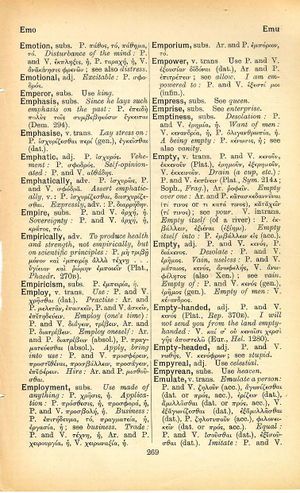emphasis: Difference between revisions
ὃ γὰρ βούλεται, τοῦθ' ἕκαστος καὶ οἴεται → what he wishes to be true, each person also believes to be true | what he wishes, each person also believes
(2) |
m (Text replacement - "(|thumb)\n(\|link=)" to "$1$2") |
||
| Line 1: | Line 1: | ||
{{Woodhouse1 | {{Woodhouse1 | ||
|Text=[[File:woodhouse_269.jpg|thumb | |Text=[[File:woodhouse_269.jpg|thumb|link={{filepath:woodhouse_269.jpg}}]]'''subs.''' | ||
|link={{filepath:woodhouse_269.jpg}}]]'''subs.''' | |||
<b class="b2">Since he lays such emphasis on the past</b>: P. ἐπειδὴ πολὺς τοῖς συμβεβηκόσιν ἔγκειται (Dem. 294). | <b class="b2">Since he lays such emphasis on the past</b>: P. ἐπειδὴ πολὺς τοῖς συμβεβηκόσιν ἔγκειται (Dem. 294). | ||
}} | }} | ||
Revision as of 17:14, 18 May 2020
English > Greek (Woodhouse)
subs.
Since he lays such emphasis on the past: P. ἐπειδὴ πολὺς τοῖς συμβεβηκόσιν ἔγκειται (Dem. 294).
Latin > English (Lewis & Short)
emphăsis: is, f., = ἔμφασις, a figure of rhet.,
I emphasis, rhetorical stress (cf.: pondus, significatio), Quint. 9, 2, 64; 8, 2, 11; 8, 3, 86 al.
Latin > French (Gaffiot 2016)
emphăsis, is, f. (ἔμφασις), emphase [rhét.] : Quint. 8, 2, 11.
Latin > German (Georges)
emphasis, eos, Akk. im, Abl. ī, f. (εμφασις), I) der Anblick, rein lat. intuitio, Chalcid. Tim. 239 in. – II) der Nachdruck-, die Kraft des Ausdrucks, der noch mehr bedeutet u. in sich ahnen läßt, als er eigentlich ausspricht, die Emphase, Quint. 8, 2, 11 u.a. Diom. 456, 29 (wo Genet.). Serv. Verg. Aen. 2, 79 u. 394: expressius cum emphasi pronuntiare, Cassian. coll. 23, 16.
Latin > English
emphasis emphasos/is N F :: emphasis; stress

